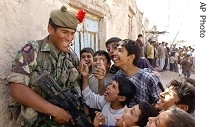2007年VOA标准英语-Fiji Provides Manpower for Dangerous Jobs in Ir(在线收听)
Suva, Fiji
14 February 2007
The Pacific islands of Fiji may seem a world away from the battlefields of the Middle East, but Fiji has become a rich hunting ground for manpower in Iraq. Fijians have a strong military tradition based on their "Bati" warrior culture, and the British army in Iraq alone includes 2,000 of them. Hundreds more are working in Baghdad for the United Nations, and for private security companies, which can be very lucrative - even if you die. Nicola Fell reports from the Fijian capital, Suva.
In a palm-fringed garden in Fiji's Burerua village, Manasa Lalaqila stands by two graves: his wife's, and that of his 34-year-old son, Timocei. Timocei died in Iraq in 2005. Lalaqila recalls the day he heard the news.
"An officer came one morning. I was staying alone here and they tried to tell me what had happened, which I find very hard to accept," he said. " I was told he got shot in the plane while on duty, flying in a helicopter escorting some officers and then they were shot by insurgents. They managed to collect his body and send it back to Fiji. So he's buried here beside his mother."
 |
| Private Matereti Vere, 25, originally from Fiji and serving with 1st Battalion of The Black Watch, left, shares a laugh with Iraqi children in Zubayr, southern Iraq |
The Bati warrior chant is traditionally sung by Fijians to prepare men for battle.
As the men of Burerua village prepare a bowl of kava, the local narcotic drink, village spokesman Leone Matai explains the Bati culture.
"Bati refers to the teeth. It bites. Mostly in every tribe, there's special Batis. I'm one of them," he explains. "People are born with their positions. In Fijian beliefs, we believe if you are a priest, you are born a priest. If you are Bati, well the genes will come through you and so automatically you will be a Bati. It doesn't matter what you do. So, if you are on the street, automatically you will become a street fighter. It's in the genes. So if you're in warfare, you are the best war man ever."
Following a recent military coup in Fiji, the British and the U.N. have stopped recruiting here. The best option to earn good money abroad now is with the security companies.
Colonel Jonetani Kaukimoce is a Fijian agent for the British security company Control Risk. In a Suva garment factory, he shows the uniforms his men work in - and sometimes die in.
"This is the company badge with the tiger sitting and watching - that says security," he explained.
A list of 150 men ready and willing to go to Iraq is pinned on his office wall, and he has already sent another 150 - two of whom died.
He says the company normally pays more than $170,000 to the family of any man killed or permanently disabled while on security guard duty, but the family of those two men received nothing.
"Some of them from this company jumped to another company. When they went there, they went as escorts. Escorts, you are liable to get shot. And when they jumped (to the other company) they were ambushed and got killed," he explained. "I received the bodies here because I was the last company, you know, to help them out. I talked to their wives and said: 'This is the body of your husband - nothing else. We don't have any compensation, no nothing.'"
As this situation shows, getting paid in Iraq is not a sure thing.
Jo, a middle-aged sugar farmer who did not want his full name used, says he was earning $100 a month in Fiji when he decided to sign up with an American security company in Iraq.
"We thought we would be paid about 6,000 - because we were doing a very hard job," he said. "It was looking after the state witnesses in Saddam's court trial. I was in charge of the witnesses: to bring them over and to take them back to the Red Zone, to their villages in Djalil, Samarra and elsewhere."
In the end, Jo says, he was paid a lot less than promised.
"They just paid us 1,200 bucks for a month, but it wasn't going into our accounts, but in cash."
Q. "Did you ever confront this American company about your pay?"
A. "We tell the boss … and he was just telling us, 'Yes, I'm going to inform the big boss.' He was just saying that and end up nowhere."
Q. "How much would they pay if you died?"
A. "The thing is, you were shown here in Fiji a different contract. And we went over, we went and signed a different contract."
Hundreds of Fijians have worked in Iraq for security companies. Most of the fatalities have occurred in security work, and many say their contracts were not honored - yet Jo is preparing to go into a war zone again.
"My next move is I want to leave for Afghanistan," Jo said. "I've got a contract there. I'll be paid 90 pounds a month."
Still standing by Timocei's grave, Lalaqila says his other son is now leaving for Iraq.
"He's leaving tomorrow," said Lalaqila.
Q. "Don't you want to tell him not to go?"
A. "They know that the risk is there, but they keep going and coming."
He does not want to confuse his son, Lalaqila says. He will leave his son to make the decision on his own.